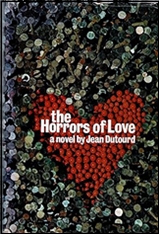Sat 12 Apr 2025
Reviewed by Dan Stumpf: JEAN DUTOURD – The Horrors of Love.
Posted by Steve under Reviews[4] Comments
JEAN DUTOURD – The Horrors of Love. Doubleday, hardcover, 1967. First published in France in as Les Horreurs de l’amour (Gallimard, 1963)
I spent most of this week making a voodoo hoodoo out of some stuff I had lying around the house: Some books, an old shelf, top hat, playing cards, manacles, a skull… that sort of thing. Hung it in my basement to attract nightmares.
Anyway, when I was putting this thing together, I had an enjoyable time digging out just the right books, and one of them was the book discussed below. And though I doubt I’ll ever revisit that book, I felt a glow of remembered pleasure when I revisited the review:

Back in the 60s when I worked as a page at the local library, I found myself strangely drawn to a thickish book that was never checked out, one that squatted stolidly in its allotted space, motionless and impassive, on the Fiction Shelf all the years I was there. I was intrigued by the title The Horrors of Love (Doubleday, 1967) and I’d seen the author’s name, Jean Dutourd, in seedy used bookstores, so I was tempted to read it — but in those days I had no time or patience for six-hundred-and-sixty-odd pages of densely — and I mean densely — written prose with no spies in it. Only now, when I’m approaching early pre-middle age and have more time and patience, I thought to give it a try.
Reading The Horrors of Love is like going through Boot Camp: tough work and not always much fun, but when it’s over you feel you’ve accomplished something. The story is set in Paris in the late 50s and concerns two men who stroll through the city discussing a mutual acquaintance.
And that’s what it’s about.
Two guys.
Walking and talking.
And talking. And talking.
For more than six hundred close-packed pages.
Well, Harry Stephen Keeler constructed some fine books that were nothing more than conversation, so why not Jean Dutourd? And in fact, I found Horrors compelling, if a bit obscure at times, because the lengthy discussion is developed with a novelist’s imagination and a philosopher‘s intellect: it seems the subject of all this conversation is a mutual acquaintance. a successful middle-aged man — shallow, untalented, lacking any insight — and how this man is destroyed by love.
It’s a sobering tale, and to Dutourd’s credit, the reader never loses sight of the point, even as the narrators digress about art, philosophy, literature, the sexes, politics, Parisian geography, history, women, writing, food, men, Algeria…. well let’s just say they fill over six hundred pages to just shy of bursting.
Which may be a problem: Good Writing is like any other commodity; when you get too much of it in one place it becomes devalued, and Horrors of Love is an awful lot of writing, mostly good, I think, but still a damnlot of writing. Some of the writers and philosophers discussed here are just names to me, and some not even that. Withal, even in the densest passages, I never felt like putting this thing down, and I turned the last page, as I said, feeling the few weeks of my time had not been wasted.

April 12th, 2025 at 8:04 pm
I read Dutourd’s A DOG’S HEAD (1951) years ago and was less than impressesd. It was supposed to be a biting satire about a man with the head of a Spaniel, but all it did was make me vow not to read another book by the author.
April 12th, 2025 at 8:28 pm
Dutourd has a Wikipedia page, but other than a long list of the novels he wrote, all first published in French, it didn’t tell me very much about either him nor his work:
https://en.wikipedia.org/wiki/Jean_Dutourd
I am not likely to read HORRORS OF LOVE, nor A DOG’S HEAD either, but if I were younger, what Dan has to say about the former might persuade me to give it a try.
I say “might,” and then again, I am of course not younger any more either.
April 12th, 2025 at 9:36 pm
The thing about books is that the experience is subjective, and different for every reader, but there is something to be said for any book we read, briefly inhabit, stay with even when it isn’t easy or fast paced, or funny just because it says something we as the reader need to hear.
Too often we get lost in the idea of a certain kind of book and lose sight that reading itself is a pleasure, a goal, and that a book can be any kind of meal from a ten-course dinner to a great hamburger.
October 5th, 2025 at 10:47 pm
I’m searching for this book! Read it over 20 years ago and it fascinated my then-teenage mind.